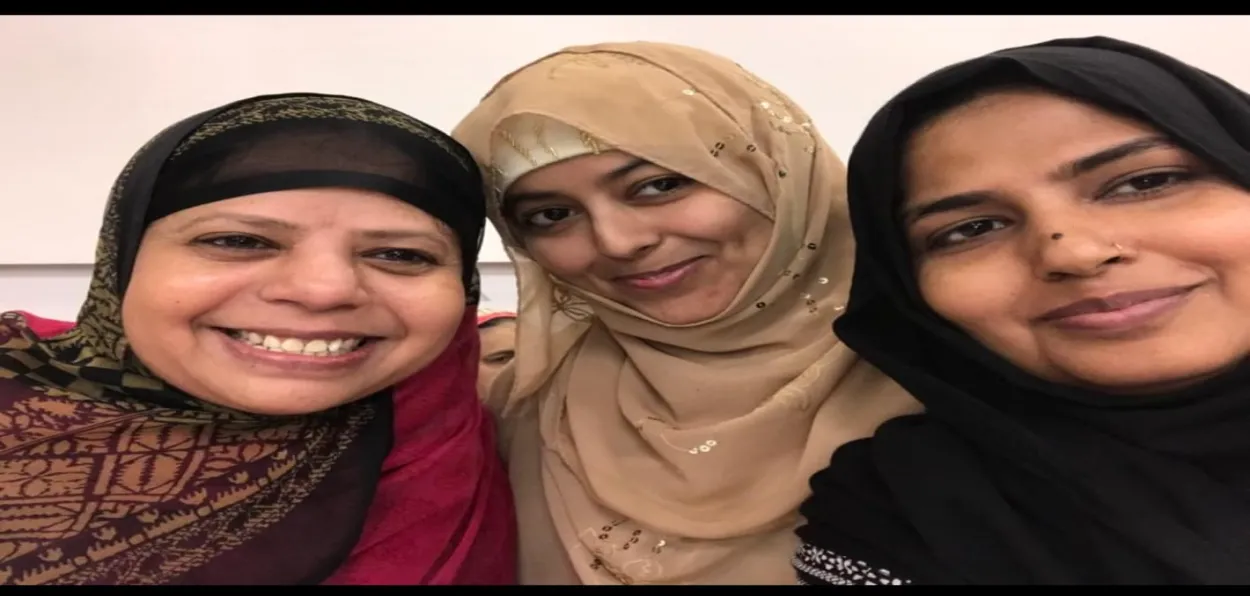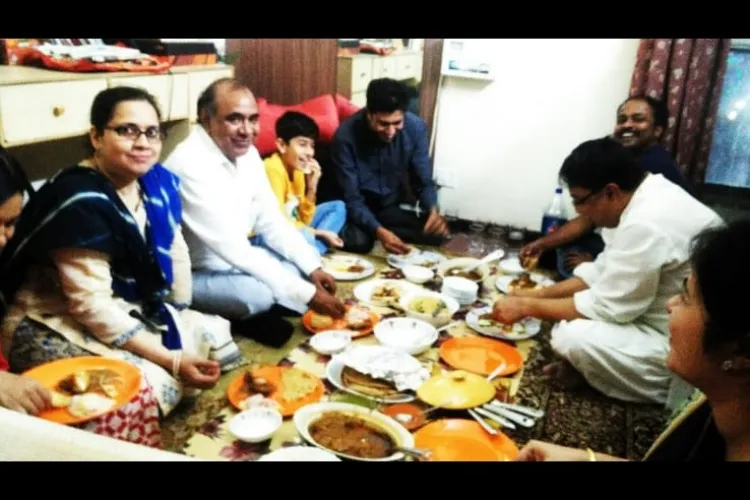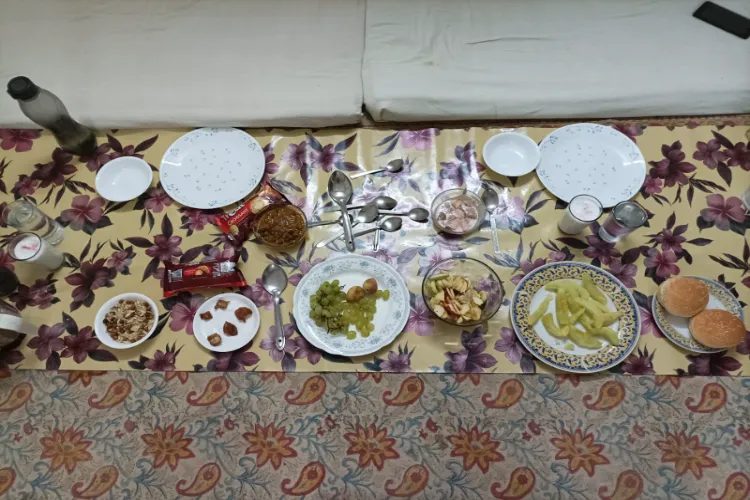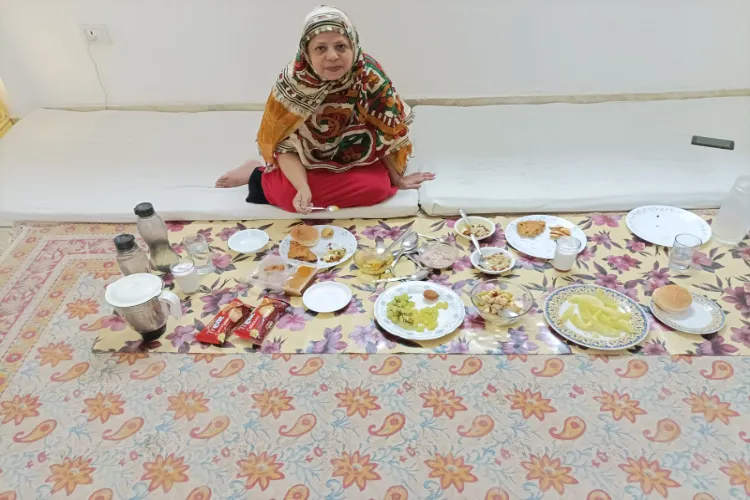
Rana Siddiqui Zaman
It’s 6.38 pm; iftar time for fasting Muslims in India. I am on my ‘dastarkhwan’ (long mat spread, for laying food items), ready to break my 17-hour roza (fast), with gratitude to Allah that I was able to endure hunger, thirst, headache, and a bit of physical weakness. My body is learning to heal from the month-long fasting. (The Nobel Prize for the year 2016 to Yoshinomori Oshum, a Japanese cell biologist, was for his research that proved that fasting for 14 to 16 hours 28 days can stop cancer cells from growing.)
Before I put that first khajoor (date) in my mouth, I pray to express my obedience to God, by uttering these words (Allah humma laka sumtu, va bik a amantu, va alaika tawakaltu, wa-la rizqiko aftartu (Ya Allah, I kept this fast for You and You, I am breaking it).
I have just taken the first morsel into my mouth when my phone rings. I pick up, hurriedly gulping some water - the thirst is insatiable at the end of the fasting. The person on the other side is in the 'luxury of time’ mode.
“Aur sunao! So, what’s up? I was free so I thought I will call you and do some chit-chat…”
“Really!” I think to myself! Does this person have no idea that Muslims at this time could be breaking their Roza after 16 to 18 hours of fasting? Is he not aware of the etiquette of Ramzan and rozas at all? What do I tell him?
This is not just about a personal call. Professional calls from the media, public relations managers, call centers, real estate agents, institutes, education houses, et al, somehow find this time between 5.30 to 7.30 to call people presuming, perhaps, that everyone in the town is travelling back home from the offices, or sipping evening tea leisurely after day’s work.
I am not supposed to get angry especially during Ramzan as it is the month of mercy and forgiveness, but I do feel angry and retort, “Does my name suggest that I am a musalmaan and that I could be breaking my roza exactly at the time when you called up?”

Author with friends in Noida, UP, for Iftaar
I can swear by the holy month, to date - and I am 50 - nobody at the other end of the phone has ever felt guilty, embarrassed, or awkward.
“Oho!”, so your rozas are on? Really?” So what all are you eating, bro, what pakwaans,” is largely a personal response while the professional caller would just hang on to complete their side of the conversation, “Okay Mam’ so I was telling you that we are selling plots, or this person will be in the city, available for an interview”, and so on!
“Can it wait?”
“Sure, shall I call in five?” This is the routine response. No emotions, no remorse, no feeling of responsibility or belonging.
One should be either curt, telling them about the norms of calling Muslims at iftar time, or not pick up the calls at all. After repeatedly telling people in vain, I have resorted to the second one.
The question is: why is a good part of India not willing to learn the norms of interacting with Muslims during the holy month? Is it because most or some of their Muslim friends do not fast at all, or is it because it just doesn’t cross their mind because no one told them, ever? Not even their musalman friends, neighbours, teachers, or elderly people at home told them this? Is Ramzan to them only about feasting after fasting?

Rana Siddiqui Zaman's dastarkhwan for Iftaar
Unfortunately, most iftar ‘parties’ are about just the host as a musalmaan, and rest from other religions, some even fasting to show solidarity. I have even attended an iftar ‘party’ by a non-Muslim friend in Aligarh, in which most guests were non-Muslims.
Muslims often host similar iftar ‘parties’, with a plethora of food items and snacks spread on the dining table. The guests are not told the dress code like covering one's body properly. The guests even come in shorts, cargo pants, and jeans –T-shirts for this “high tea” look-alike occasion!
Whose fault is this that people mostly do not know about etiquette and proper behaviour during Ramzan, Rozas, iftar, or seheri? (iftar is never a party, for god sake). It is a gratitude time to the Almighty and humility that comes by remaining hungry and thirsty, remembering those who can’t afford even two square meals a day. Iftar is also not meant for the people, eating the whole day and attending the ‘party’ as a freak-out get-together, either.
Ever since I started fasting in my teens, I have noticed my father’s clients, officer bearers, or my siblings’ friends just dropping by for some conversation or to play indoor games, during the evening, without realising that the whole family must be fasting and this is iftar and prayer time for them. This is also perhaps because we lived mostly in non-Muslim areas, cosmopolitan, so to say.
Its usual business during Ramzan
Let’s also talk about cultural evenings, art, theatre, literature, and film shows that are generally in full swing during this month of Ramzan. The organisers do not bother to take into account that it's the month of fasting for Muslims, many of whom would have otherwise liked to join the shows. Often the timings of such shows coincide with the iftar.
Recently, I raised this point in a Whatsapp group of intellectuals, literary and theatre icons, and filmmakers. I told them that I had received an invitation to a show that I would have loved to attend. However, due to my obligation to Ramazan, I couldn't go. I asked if Ramazan month could be taken as a light month for the shows. I received mixed responses. While a well-known author accepted that “we never thought about it, it just didn’t cross our minds”, another person said that it’s alright to skip a few things if one’s priorities are defined, others chose to remain silent! I also remember, almost all my life school life, we used to get several holidays for Diwali and Holi, but just one that was restricted for eid-ul-fitr, and eid-uz-zuha, and Christmas or Gurupurab. It simply reflects, how a Muslim festival that involves a month of fasting, was never a matter of concern for consideration of a few days off in schools.

The author at Iftaar time ather home
I think it's time to discuss inter-religious interactions in India and move beyond the exchange of customary greetings on religious occasions.
I always avoid visiting Hindu friends on Diwali or Holi at the time of Pooja, as it is largely a private family affair in most homes.
Once I and my husband were at a friend’s place where for some reason, pooja was to be held late. We were made to join the Pooja. While it surely was an experience and I ended up learning quite a few things, I strongly feel one must follow the norms and etiquette of visits on such occasions.
All the Indians must know that the month of Ramzan is about fasting; it's not a ‘party’. It is about doing charity and not about kababs and biryanis and “tum log to raat bhar khate rehte ho na" (you guys keep on eating the whole night and fast in the day!) kind of impressions about Muslims. It is not about eating together with rich and satisfied people but making sure, no rozedar (the one who keeps fast) in your neighbourhood goes hungry. It is not right to complain to Muslims that “aapne kabhi iftar ‘party’ main nahi bulaya (you never invited us for iftar party), but practicing fasting for the day to be invited to iftar food and ambiance in the evening.
Also, it's wrong to call someone at the iftar time unless it's an emergency. It is about respecting a rozedar. So next time during Ramzan, please make sure, you do not call any Muslim at iftar time. One could check with Google to find the local Iftar time.
Do I come across as a fundamentalist, small-minded musalman? Maybe others will put harsher labels on me for this outburst. However, I am sure, sensible, and saner people have got the message and they have decided to help me spread the word too.
ALSO READ: India's Sufi connection to Central Asia unravels spiritual and cultural synergy
And that’s all that matters. After all, India is about coexistence and syncretic culture!
Rana Siddiqui is a senior journalist and a film critic
